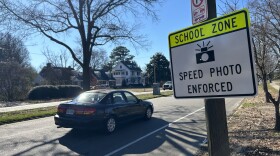Most of Iowa’s traffic cameras that issue speeding tickets in permanent locations must be turned off after the Iowa Department of Transportation denied the vast majority of cities’ requests to operate them.
A new law regulating traffic cameras in Iowa required local governments with automated traffic enforcement systems to apply for a permit from the DOT to continue operating those systems. Cities and counties have to prove to the state that their traffic cameras that automatically issue speeding tickets are appropriate, necessary and the least restrictive way to address traffic safety at those locations. The DOT notified communities of its decisions on Monday afternoon.
According to the DOT, local governments requested the use of traffic cameras at 348 locations across the state, including fixed and mobile cameras. The DOT approved 154 of them.
Only 11 of the 139 fixed cameras were approved for continued use. There are four in Cedar Rapids, four in Davenport and one each in Des Moines, Le Claire and Marshalltown.
As for mobile speed cameras, 143 of the 209 locations were approved. They are all in eight cities.
Eighteen of the 28 communities that applied for a permit were fully denied. Only one city — Fort Dodge — had all of its cameras approved. Nine cities total got to keep some of their cameras.
The purpose is to make our community safer, so I don’t understand why you would deny the communities a way to do that.Chad Alleger, Prairie City Mayor
Chad Alleger is mayor of Prairie City, which had to turn off its fixed speed enforcement cameras. He said he was surprised that the DOT denied their permit request by saying Prairie City’s cameras are not necessary.
“The purpose is to make our community safer, so I don’t understand why you would deny the communities a way to do that,” he said.
Alleger said the town of about 1,700 people started using fixed traffic cameras in two locations about three years ago. He said the goal was to reduce speeding in front of the elementary and middle school, and along the route that students travel to Monroe to go to high school.
“We met all the criteria,” Alleger said. “We have the data to show that we have reduced speed out on [highway] 163 and in front of the school. So I don’t understand the explanation of ‘not necessary,’ because it proves that it is working.”
He said Prairie City used the revenue from the traffic cameras for special projects. Alleger said the speed camera money helped pay for a new library, and it was supposed to help fund a new fire department and emergency services building. He said the city will have to find a different way to fund the completion of that building.
The law also barred cities with a population of 20,000 or less from issuing tickets from mobile speed camera systems. They are only allowed to issue warnings for speeding.
“I don’t understand how the size of your community should dictate whether you have speed cameras or not,” Alleger said.
He said he is seeking more information from the DOT about why it determined Prairie City’s cameras don’t fit the requirements set out by the law.
According to Keri Greenfield, an executive assistant with the Iowa DOT, the law states the DOT can approve or deny a permit based on its determination “that a system is appropriate and necessary and the least restrictive means to address the critical safety issues at a location.”
Greenfield said the law defines critical safety issues as including traffic violations resulting in a collision or accident, and traffic collisions and accidents resulting in serious injury or death.
A seven-member panel reviewed the permit applications based on these definitions and came up with the following:
- Necessary means: “Critical traffic safety issues exist at a location to the degree where control of vehicle speeds is essential.”
- Appropriate means: “Use of an automated traffic enforcement system at a location complies with the law’s requirements and is the right method to control vehicle speeds.”
- Least restrictive means: “All other methods to control speeds at a location have been exhausted or are impractical.”
The new law requires cities to post signs notifying drivers of the cameras. They cannot issue automated tickets unless the driver was going more than ten miles per hour over the speed limit.
Some Republican lawmakers, as well as the ACLU of Iowa, have been trying to ban automated traffic enforcement for years. Some opponents of traffic cameras have accused cities of abusing automated traffic enforcement to boost local budgets.
The bill regulating traffic cameras passed with bipartisan support in the Iowa Legislature with just about a dozen lawmakers voting against it.
The cities that get to keep at least some automated traffic enforcement cameras are:
- Cedar Rapids (fixed and mobile)
- Davenport (fixed and mobile)
- Des Moines (fixed and mobile)
- Fort Dodge (mobile — all approved)
- Le Claire (fixed)
- Marion (mobile allowed, fixed denied)
- Marshalltown (fixed)
- Muscatine (mobile allowed, fixed denied)
- Sioux City (mobile)
- Waterloo (mobile allowed, fixed denied)
The local governments that are no longer allowed to operate automated traffic enforcement systems are:
- Buffalo
- Charles City
- Chester
- Fayette
- Fredericksburg
- Hazleton
- Hudson
- Independence
- La Porte City
- Lee County
- Maynard
- Oelwein
- Postville
- Prairie City
- Strawberry Point
- Tama
- Webster City
- West Union






